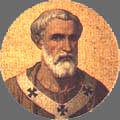 Alberic II, now holding supreme temporal power in Rome, had no
intention of seeing an independent pope arise who might try to get back the
papacy's temporal power.
Alberic II, now holding supreme temporal power in Rome, had no
intention of seeing an independent pope arise who might try to get back the
papacy's temporal power.
Accordingly, Alberic saw to it that the clergy always chose his
man. This much must be said for Alberic: usually his man was a good man. After
the death of his brother, John XI, Alberic secured the election of Leo VII. Leo
was a Roman, the priest of St. Sixtus. He was probably a Benedictine monk. He
was certainly a pious and spiritual man. Learned and gracious, Leo was not
interested in becoming pope, and it took a little pressure to gain his consent.
His lack of ambition probably commended him highly to Prince Alberic.
Leo VII granted privileges to various monasteries, especially to
Cluny. He sent for St. Odo, the abbot of Cluny, to help bring peace to wartorn
Italy. Hugh of Provence, though driven from Rome by his stepson Alberic, was
still king of Italy, and actually had some power in the North. Not the man to
accept defeat easily, Hugh continually attacked Alberic and on three occasions
laid siege to Rome itself. It was on one of these occasions that Pope Leo VII
asked St. Odo to come down from France and mediate between Hugh and Alberic. The
great abbot worked hard and produced a patched-up peace. Alberic agreed to marry
Alda, Hugh's daughter, and Hugh agreed to take his army home. Alberic and Pope
Leo saw eye to eye in their attitude toward monks and monasteries. Alberic
persuaded St. Odo to take over the supervision of all the monasteries around
Rome. He also gave his old home where he had been born to be a monastery in
honor of Our Lady. To this day the monastery of Our Lady on the Aventine
survives as a memorial to the piety of Prince Alberic II.
Pope Leo VII cooperated in the grand work of restoration being
done in Germany by Henry the Fowler and his son Otto. He appointed Frederick,
archbishop of Mainz, to be his legate for all Germany so that he could reform
the clergy. He refused to allow the overzealous German to baptize Jews by force,
but he was enough the child of his age to permit Frederick to drive the Jews out
of the cities if they would not accept baptism. Leo VII died in July, 936.
Excerpted from "Popes
Through the Ages" by Joseph Brusher, S.J.

